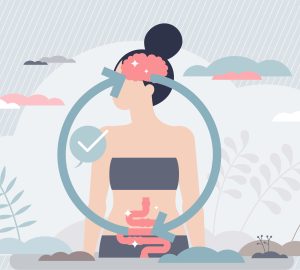Most people with eczema experience it first as children, but sometimes the skin condition appears during adulthood, causing discomfort that can interfere with daily life. PALM Health primary care physician and functional medicine specialist Dr. Karrie Hohn says childhood eczema typically affects the elbows and backs of the knees, while adults usually get it on the hands and face, including the eyelids.
“Eczema, also known as dermatitis, causes the skin to be itchy, dry, scaly and red,” Hohn explains. “In the worst cases, it may be open, weeping and blistering. Eczema can feel as uncomfortable as a burn, and it may hurt to move or use the hands because the skin is cracked and painful.” Sometimes irritation occurs when adults have an allergic reaction to poison ivy or oak, or metals found in some jewelry, belt buckles and fasteners on pants. “Other causes include environmental irritants like bleach and detergents,” Hohn says. “Moisture and the chemicals used in printing paper money also can cause problems. Some people also experience worse symptoms with dry indoor air in the winter.”
Hohn says adults tend to develop the condition because they are doing something differently than before, like starting a job that requires the use of chemicals or detergents. “You’ve been exposed to a new substance, so your immune system has changed, and your skin starts to react for the first time,” she says. “To treat the condition, it’s important to look at your overall health and lifestyle, then try to avoid repeat exposure and restore the skin’s normal moisture barrier.”
If your work involves moisture or chemicals, consider wearing rubber gloves, and if conditions are dry, cotton gloves may be helpful. Some people also benefit from wet-to-dry dressings, like wearing a dry T-shirt over a damp one while sleeping. “This can help loosen the crusting and soothe the skin,” Hohn says.
She recommends trying over-the-counter products like A&D Ointment or Vaseline, which can provide emollients to help restore the moisture barrier. “You also might try a heavy, unscented cream—not a lotion—that is formulated for eczema. Products like CeraVe are made with ceramide, which is helpful, and urea-containing products like Eucerin may be beneficial as well.” Oral antihistamines and daily fish oil capsules may provide additional relief, she notes.
“It’s important to speak with your health care provider about the best course of treatment for eczema,” Hohn advises. “Environmental or food allergies may be factors, so your doctor may recommend allergy testing to find out what substances are causing problems. A diet that eliminates certain foods may help. Eggs, gluten and dairy are among the most common food allergens.”
Hohn says people with chronic gastrointestinal problems like acid reflux, gas, bloating and cramping may be more likely to develop eczema. “If your gut is in a state of imbalance, your skin may respond negatively,” she says. “A good practitioner can examine your whole health picture and address issues like diet that can help improve your skin—and your health in general.”








